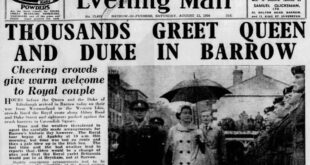No recommendation
No news or research item is a personal recommendation to deal. All investments can fall as well as rise in value so you could get back less than you invest.
Full year revenue rose 0.6% to £12.7bn. Strong performance from GLS offset declines at Royal Mail, as shipping behaviours changed following lockdowns.
Underlying operating profit rose 8% to £758, reflecting the cost saving improvements at Royal Mail.
Assuming a pay deal can be reached around the current offer, Royal Mail expects adjusted operating profit of £303m in the next year. GLS is targeting operating profits between €370m and €410m.
The group announced a 13.3p final dividend, bringing the total for the year to 20p.
Shares were broadly flat following the announcement.
View the latest Royal Mail share price and how to deal
Our View
After a boom in parcel volumes due to the pandemic, things are starting to settle. The good news is it appears to be at a higher base and Royal Mail’s more efficient operations mean profits are still on the rise.
The group’s reduction in costs and operating efficiency has been a huge step in the right direction. Operating profit margins are up nearly a full percentage point. That’s no accident, reflecting significant restructuring work as well as increased investment.
Nowhere is that better illustrated than in the progress the group has made on automation. Back in 2018-19 just 12% of parcels were sorted automatically, today that’s up to 50% despite a huge uplift in parcel volumes, and the group has ambitions of hitting 90% in the not too distant future. Automated parcel sorting is more cost effective, but also improves quality and provides the extra flex needed to deal with peaks and troughs in demand.
Further plans are afoot, with the next step in the transformation program set to reduce management positions by around 700. The group’s clashed heads with unions in the past over staff cuts, so it’d be no small feat if they can reach an agreement on this. Plus, once initial costs are out the way, that could be another c. £40m saving a year moving forward.
Investment in parcels infrastructure is set to increase capital expenditure, expected to be around £350m next year in the UK alone. Construction of a new, fully automated parcels hub in the Midlands is underway, capable of sorting over a million parcels a day by 2023.
At the PLC level, Royal Mail also benefits from the strength of its international business GLS. It’s historically the fastest growing part of the business and remained robustly profitable throughout the pandemic. Relatively modest spending requirements going forwards mean it’s a blueprint the group would love to emulate in the UK.
We’re pleased to see shareholder returns are up and rolling again. As long as the group’s able continue offsetting investment through efficiency, the balance sheet should be resilient enough to support this. But remember nothing is guaranteed.
Long term, we think shrinking the cost base, investing in technology and adding to international acquisitions are some answers. If Royal Mail can weather rising cost inflation, then with a price to-earnings ratio some way below the long run average, and a prospective dividend yield near 7%, the group will be looking more attractive than it has for a long time.
Royal Mail key facts
- Price/Earnings ratio: 6.5
- 10-Year Average Price/Earnings: 12.1
- Prospective dividend yield (next 12 months): 6.8%
All ratios are sourced from Refinitiv. Please remember yields are variable and not a reliable indicator of future income. Keep in mind key figures shouldn’t be looked at on their own – it’s important to understand the big picture.
Sign up for updates on Royal Mail
Full Year Results
Revenue declined from £12.6bn to £12.7bn at Royal mail, reflecting a 13% decline in parcel volumes. This was still 16% higher than pre-pandemic levels as domestic parcel volumes remained elevated. Letter volumes were up 3% compared to last year as Advertising Mail resumed after lockdowns. But the overall decline continued with letter volumes down 18% compared to 2020. The group’s cost saving programme helped operating costs fall by 2.5%, which meant operating profits were up from £344m to £416m.
GLS saw revenue rise from £4.0bn to £4.2bn, driven by a 4% increase in volumes due to increased business to business activity. Growth was achieved in almost all geographical markets. Operating profits fell by 4.5% as inflation and driver shortages weighed.
Free cash flow fell from £770m to £420m, reflecting increased capital expenditure as the group continued to invest in automation at Royal Mail. This fed into an increase in net debt from £457m to £985m.
Find out more about Royal Mail shares including how to invest
This article is original Hargreaves Lansdown content, published by Hargreaves Lansdown. Unless otherwise stated estimates, including prospective yields, are a consensus of analyst forecasts provided by Refinitiv. These estimates are not a reliable indicator of future performance. Yields are variable and not guaranteed. Investments rise and fall in value so investors could make a loss.
This article is not advice or a recommendation to buy, sell or hold any investment. No view is given on the present or future value or price of any investment, and investors should form their own view on any proposed investment. This article has not been prepared in accordance with legal requirements designed to promote the independence of investment research and is considered a marketing communication. Non-independent research is not subject to FCA rules prohibiting dealing ahead of research, however HL has put controls in place (including dealing restrictions, physical and information barriers) to manage potential conflicts of interest presented by such dealing. Please see our full non-independent research for more information.
Source link



